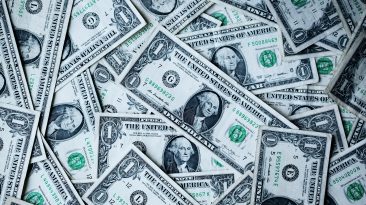As the CEO and founder of Amazon, the multibillion dollar online shopping company, Jeff Bezos is the richest person on the planet. With a current net worth of $193.7 billion, Bezos can buy just about anything.
If you’re feeling good about that $100,000 salary of yours, well, Jeff makes about that every minute. That’s $6 million an hour.
Jeez, I think it’s time to ask for that raise. So, what would you do with all that money? What are some of the most expensive items you could buy?
Could you end world poverty for good? Why might being rich make you unhappy?
As a former Wall Street computer engineer, Jeff’s humble beginnings with Amazon began in 1994. It all started in his garage in Seattle.
What began as an online store for books, CDs and software grew quickly during the internet boom. By 1997, Amazon stock was up by 40%, netting Jeff a cozy $12 billion.
Fast forward twenty years, Amazon has dominated the online marketplace and has grown astronomically. With all this newfound wealth, Jeff made the single-largest charitable contribution ever. $10 billion to help fight climate change. But as far as his net worth goes, that’s a tiny drop in the bucket.
If you had Jeff’s fortune, how would you spend it? How about a shirt made of pure gold for only $250,000? Ooh, shiny. Or maybe a $276,000 Mongolian dinosaur skull suits your fancy?
Any interest in a 14-foot preserved shark for $12 million? Or if you want your tushy to feel pampered, how about a 24-carat solid gold toilet? Talk about flushing your hard-earned money down the drain! With Jeff’s riches, you could pick up a $65 million Gulfstream private jet or even purchase citizenship to a foreign country.
Want to be an Austrian citizen? A passport will cost you a whopping $23.7 million. Citizenship to Cyprus, Malta, Turkey, and certain Caribbean islands is also up for grabs.
With hundreds of billions of dollars, the sky’s the limit. If you got the money overnight, you’d likely be invited to apply for the Centurion Card from American Express, the ultra-exclusive credit card made of black titanium.
Or, if you’re feeling more like Scrooge McDuck, you could liquidate everything and fill your home with a mountain of cash. But this would remove 15.7% of the U.S. currency in circulation. Okay, would all of this money make you happy. You might be surprised.
A study published in the journal Nature Human Behaviour found that the richer we get, the less happy we become. Once you reach $105,000 in household income, any more money tends to be associated with reduced life satisfaction and a lower level of well-being. And that’s not just because of higher taxes.
The “treadmill effect” is a term coined by psychologist Elizabeth Lombardo. We think more things or more money will make us happy, but as soon as we get it, we wonder, what’s next? Could more happiness be around the corner? Should I buy ten exotic cars instead of just one? Gimme, gimme, gimme.
Both children and adults are affected by this phenomenon. Children of affluent families are more likely to suffer from depression, anxiety, and substance abuse later in life. So, parents, you might want to slow down on the toys. Your three-year-old does not need an iPad.
Researchers at the Harvard Business Review have concluded that wealth is isolating. The more status we have, the more we feel a psychological urge to distance ourselves from others. This can possibly be due to a feeling of competition or selfishness, but also a general lack of reliance on other people for survival.
Many of the wealthiest elites are workaholics. Like Elon Musk, whose plans to colonize Mars, build electric cars, and develop brain implants keep him busy enough he only sleeps six hours a night.
Being extremely wealthy also makes you a much higher target for kidnappers and the paparazzi. So good luck going out to your favorite restaurant.
Aside from all the glitz and glamour, could charitable donations bring you happiness? Becoming a philanthropist could certainly solve a lot of global problems. 689 million people are living in extreme poverty worldwide. This number is expected to grow by 115 million this year due to the COVID-19 pandemic. According to the charitable donation project, Global Giving, it would take between $7 and $265 billion to solve world hunger.
If you gave 804 million people just $3.20, the money needed to surpass the lowest poverty threshold, it would cost you $1.05 billion. Mere pocket change for Jeff Bezos.
Around 2.2 billion people don’t have access to clean water globally. But not even Jeff Bezos’ fortune could solve this problem entirely. You could, however, help the folks in Flint, Michigan. Around 140,000 residents have been exposed to poisonous lead in their water supply. Replacing the lead pipes would cost you anywhere from a few billion to $50 billion.
A report released by the Bay Area Council Economic Institute determined that it would cost $12.7 billion to end homelessness in San Francisco. You could certainly pay for that and still have lots left in the bank.
Even if you’re not a billionaire or a millionaire, experiences bring us the most joy. It won’t cost you a penny to volunteer at food banks or shelters. And there are plenty of opportunities to volunteer abroad and help the less fortunate.
All in all, no matter what you earn, it’s important to be thankful for what you have. Still, I know some of you may be dreaming about buying your first Lamborghini or paying off your student loans. Maybe stocking up on bitcoin could help?
Sources
- “Top 10 richest people in the world, top Billionaires”. Business Insider.
- “Jeff Bezos will donate $100 million to help food banks that are facing shortages due to the coronavirus outbreak”. Avery, Hartmans. 2021. Business Insider.
- “Bloomberg – Are You A Robot?“. 2021. bloomberg.com.
- “Jeff Bezos plans to step down as Amazon CEO later this year. Here’s how he makes and spends his $196 billion fortune.”. Andy Kiersz , Taylor Nicole Rogers , and Hillary Hoffower 2021. Business Insider.
- “The Most Ridiculous Things Wealthy People Have Ever Purchased”. 2017. grunge.com.
- “Becoming a citizen of Malta will cost you about $1 million, while Cyprus runs about $2.3 million. An Austrian passport will cost you a whopping $23.7 million.”. 2021. Business Insider.



























